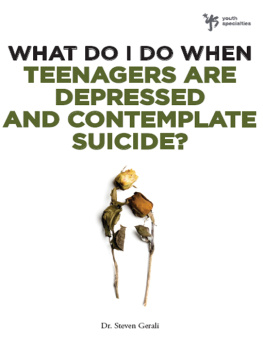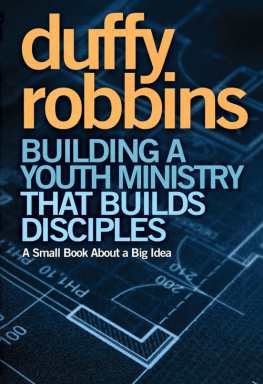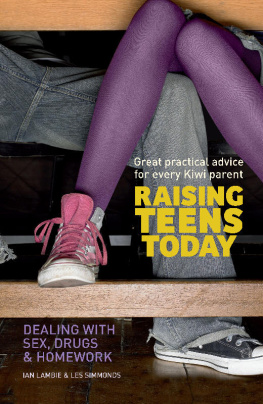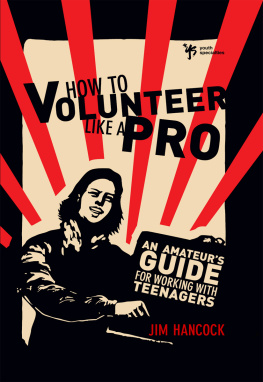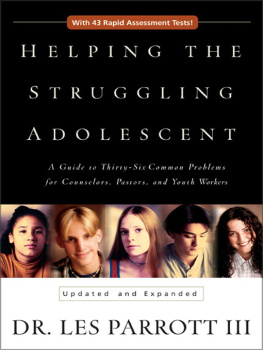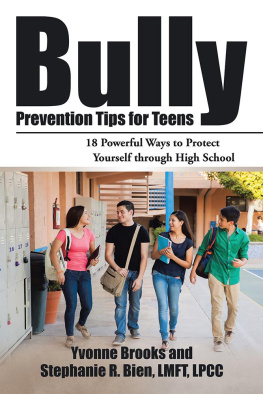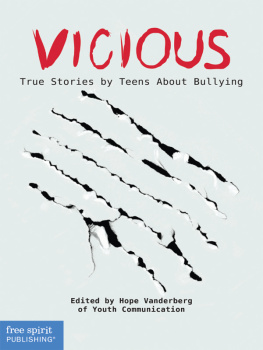ZONDERVAN
What Do I Do When Teenagers Are Depressed and Contemplate Suicide?
Copyright 2009 by Steve Gerali
All rights reserved under International and Pan-American Copyright Conventions. By payment of the required fees, you have been granted the non-exclusive, non-transferable right to access and read the text of this e-book on-screen. No part of this text may be reproduced, transmitted, down-loaded, decompiled, reverse engineered, or stored in or introduced into any information storage and retrieval system, in any form or by any means, whether electronic or mechanical, now known or hereinafter invented, without the express written permission of Zondervan.
ePub Edition November 2009 ISBN: 978-0-310-60000-8
Youth Specialties resources, 1890 Cordell Ct. Ste. 105, El Cajon, CA 92020 are published by Zondervan, 5300 Patterson Ave. SE, Grand Rapids, MI 49530.
ISBN 978-0-310-29196-1
All Scripture quotations, unless otherwise indicated, are taken from the Holy Bible,Todays New International Version. TNIV. Copyright 2001, 2005 by Biblica, Inc. Used by permission of Zondervan. All rights reserved worldwide.
Any Internet addresses (websites, blogs, etc.) and telephone numbers printed in this book are offered as a resource. They are not intended in any way to be or imply an endorsement by Youth Specialties, nor does Youth Specialties vouch for the content of these sites and numbers for the life of this book.
All rights reserved. No part of this publication may be reproduced, stored in a retrieval system, or transmitted in any form or by any means electronic, mechanical, photocopy, recording, or any other except for brief quotations in printed reviews, without the prior permission of the publisher.
Cover design by Invisible Creature
Interior design by Brandi Etheredge Design
Contents
What Do I Do When...
BOOK SERIES
Its very important you read this Introduction. This series of books has grown out of years of listening to professional and volunteer youth workers wrestle through difficult ministry situations. I usually know whats coming when the conversation starts with, What do I do when? Most of the time theyre looking for remedial help, but many times the issues covered in this book series have no preventive measures available. Many of these issues arent given serious thought until they evidence themselves in the fabric of ministry. Then youth workers, church staff, parents, and even teenagers scramble to get some kind of understanding, remedy, support, or theological perspective on the situation. This series is designed to help you.
Before we move too far ahead, you need to know a few things. First, just because you read these books and acquire some helping skills, that doesnt make you a professional counselor or caregiver. In many situations youll need to help parents and teenagers network with professional mental health workers, medical professionals, or, in some cases, legal counsel. Oftentimes the quality of care regarding these issues lies in the rapid response of helping professionals. So if you dont get anything else out of this series, get this: The best thing you can do as an effective helper is realize youre not a trained counselor and you must refer, refer, refer.
Second, often when youth workers are in the throes of an issue, theyll quickly access the Internet for help and information. Researching something online can be very time-consuming, and it can provide unreliable information. So this book series is designed to offer reliable information thats quickly accessible for anyone whos working with adolescents.
Third, each book follows a similar format designed to help you navigate the information more easily. But more importantly, it also provides a model to help you deal with the issue at hand. What Do I Do When books are divided into the following four sections:
SECTION 1: UNDERSTANDING THE ISSUE, OR PRESENTING PROBLEM
Each book will start with an epistemology of the issuein other words, the knowledge regarding its nature and scope. Many youth workers formulate their opinions, beliefs, and ideas using faulty information thats been passed through the grapevineoften without realizing the grapevine has root rot. Faulty information can change the trajectory of our actions in such a way it actually causes us to miss the mark. And many times our misses can be destructive to a kid whos already struggling with a painful issue.
We cannot expect to lead a teenager to the truth of Scripture if we start with a foundation thats built upon a lie or deception. We must be informed, seeking to understand the presenting problem as learners with a teachable spirit. In some cases these books may provide only the basics about an issue. But hopefully theyll be enough to create a solid foundation that gives direction for further research from reliable sources.
SECTION 2: UNDERSTANDING HOW YOUR THEOLOGY INTERSECTS THE ISSUE, OR PRESENTING PROBLEM
Each book will also cover at least one theological perspective that informs the situation. However, please note I plan to give theological insights from multiple perspectives, so youll know the theological voices adolescents and their families hear. Some of these voices may not resonate with your particular view, but its important you develop a gracious, loving, and understanding heart. Keep in mind youre dealing with desperate, hurting, and broken people whoin the midst of their pain and struggleare seeking grace and hope, not someone with theological answers.
I realize theres a danger in writing like this. Whenever the playing field is leveledin other words, when ones internalized theological framework is challenged or an opposing theological view is givenit can quickly become a fisticuffs arena to champion truth. I believe that truth brings freedom (John 8:32). But lets remember that the Pharisees believed theyd cornered the market on truth simply because they held to a rigid interpretation of the Scriptures, yet they failed to listen for Gods voice in others especially in the Messiah.
A dear friend of mine once confronted a group of students by asking, Is your interpretation of Scripture always right?
The students knew that if they replied affirmatively, then theyd set themselves up as the source of infallibility. So they replied, No, nobody can be right all the time.
My friend then asked, In what areas are you wrong?
His wisdom during that loving confrontation helped those students see that unless they openly and graciously engaged the theological perspectives of others, theyd never know if their own perspectives were lacking. Our goal in helping kids through difficult issues is to usher Christ into their situations. Many times that may not be with answers but with presence, affection, support, and understanding.
I recall a situation in which my dear, sweet, Italian mother was hurting for a young couple whod been caught in sexual sin (she and my dad had mentored this couple). The disciplinary actions of the church were harsh and shaming. So while the church acted in rightness, it failed to see other theological perspectives that informed this situation, such as a theology of reconciliation, grace, confession, and absolution. In my conversation with my mother, I heard her engage these things because she, too, entered into the process and pain of this young couple, and she refused to apply a static template of dealing with the issue in a right way. Instead, she decided to deal with the issue first in a loving and good way.
Its important to remember that many times rightness is not goodness. God has called his people to be good (Matthew 5:16, Ephesians 2:10, 1 Timothy 6:17-19)not always right. That doesnt mean we ignore truth, nor does it mean we minimize the authority of Scripture. It just means we must be incredibly and painfully careful to err on the side of that which is loving and good. Wrestling through various theological viewpoints, even if we dont initially agree with them, will keep us in the tension of being loving and good.
Next page
